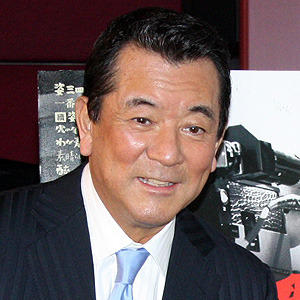Kayama Yuzo (born 1937, 加山雄三) was the son of the likable Uehara Ken, Japan's biggest male star of the 1930s. So father so son: the handsome Kayama Yuzo achieved the same for the 1960s. He became symbolic of postwar Japanese affluence and confidence, most famously in his title role in the 17 "Young Guy" (Wakadaisho) movies he made for Toho.
Kayama Yuzo was born in Yokohama and went to Keio University in Tokyo. After graduation, he joined the Toho studios, like his father before him. He debuted in 1960 in Otoko Tai Otoko ("Man against Man"), a sort of gangster movie with Mifune Toshiro. In 1961, he also started a career as singer-songwriter, and took part in the famous New Year's Eve NHK show Kohaku Uta Gassen. His most famous song, that also features in several of his films, was "Kimi to itsu made mo," ("For Ever With You") - the single sold more than 3 million copies.
Kayama specialized in romantic comedies where he would often sing his own songs. But he was also asked for serious films, such as Kurasawa's Red Beard (Akahige, 1965) in which he played one of the major roles, that of the young doctor Yasumoto Noboru. He also played in Kurosawa's earlier Sanjuro (1962) as Izaka Iori. Other important serious roles were that of Lord Asano in Inagaki's Chushingura (1962), that of the male protagonist Morita Koji in Naruse's Midareru (opposite Takamine Hideko) and Utsuki Hyoma in Okamoto's Sword of Doom (1966).
But the role with which Kayama Yuzo became identified was that of Wakadaisho, the "Young Guy" (literally, young captain, the team leader of a sports team). Wakadaisho ran from 1961 to 1971 and was one of the four comedy series and money cows of Toho in the 1960s (the others were the Shacho and the Ekimae series with Morishige Hisaya, and the "Crazy" series with Ueki Hitoshi). All films are in color and CinemaScope and feature broadly filmed sports events (it was no coincident that the series started a few years before Japan played host to the Olympics).
The series took its inspiration from a 1933 film by Shimizu Hiroshi, Daigaku no Wakadanna ("The Young Master of the University"). Kayama plays Tanuma Yuichi, the son of a traditional sukiyaki restaurant and at university the leader of a sports club - a different sports in each film. He lives with his father Kyutaro (a rather irascible person, played by Arishima Ichiro) and a cute and comic granny Riki (a great performance by Iida Choko). Tanuma's counterpart at the same university (Kyonan Daigaku) is the "Aodaisho," Ishiyama Shinjiro, played by Tanaka Kunie. "Aodaisho" in fact is the Japanese Rat Snake and in the film is a spoiled rich kid (looking unattractive and funny) with a yacht and a sports car, who uses his money power to compete with the Wakadaisho for girls. But that happens all in a good mood. The roles of the girl friends are usually played by Hoshi Yuriko, Sakai Wakako and Sakaguchi Ryoko. Kayama's father, Uehara Ken, would also have brief roles in various of the films.
The films all follow the same pattern. The Wakadaisho happens to meet a nice young woman and they fall in love. The Aodaisho in some way or another obstructs the course of their courtship, while the fact that Tanuma is very popular with other women, causes the new face to have fits of jealousy. Then Tanuma wins first place in an important sports event as representative of Kyonan University, and the young lovers make up their differences.
The sports featured are: swimming, boxing, marathon running, yacht racing, American football, skiing, soccer, judo, motor sport, fencing, skating, tennis and skydiving. All films have scenes where Kayama Yuzo sings and plays the guitar. Several films were made partly at locations outside Japan, such as Switzerland, New Zealand and Hawai'i.
In the late sixties Kayama got too old to play a student, so in the 12th film ("The Wakadaisho of Rio", 1968) he is allowed to graduate, and from the next film on plays a salaryman. Instead of winning sports events, he now clinches deals for his company.
Kayama has maintained his romantic appeal for nostalgic audiences in Japan and still often appears on the stage and on television.
